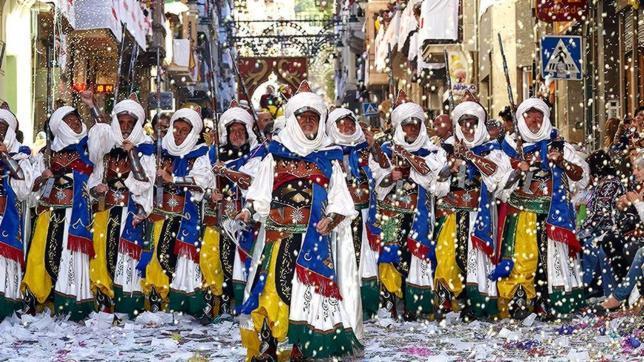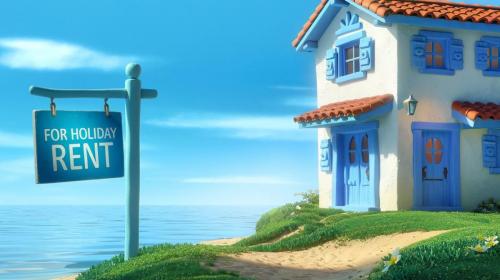Celebrations and festivals on the Costa Blanca: The happiness of owning a property on the Costa Blanca!
Have you ever heard anything about the battle with tomatoes? Or the happy procession of the funeral of the sardine, a small river fish? If you have not, then it's time to get acquainted with Spanish southern coast! After all, festivals and celebrations are an important part of the Spanish culture. There is a lot to see: the beaches of Costa Blanca, dozens of museums, parks, restaurants and beautiful nature. A charming natural environment that increasingly tempts visitors to own a summer house on the Costa Blanca. But the celebrations make this place especially attractive. This shows the cheerful and active spirit of the locals!
National Spanish celebrations
It is said, that if Spanish have paella, wine and celebrations, they are happy all year round. We will begin this journey of celebrations, fireworks, costumes, alcohol and fun on the Costa Blanca, from the New Year's celebration. If you own a property on the Costa Blanca you will be able to enjoy them all. And if you decide to rent an apartment, knowing when the different celebrations occur will help you choose the best moment to do so.
Good, Old, New Year
After Christmas, Spanish people celebrate the New Year. It is celebrated the same way on the coast as it is in the whole country. Costa Blanca lights up with thousands of lights and illuminations, noisy entertainment shows are held and the decorated Christmas trees appear in the courtyards. But not all Spanish see the Christmas tree is a symbol of celebration, in some towns local people instead of a Christmas tree like to decorate their houses with a Christmas flower- the poinsettia. Many festivals in Spain are held in different ways, they become a unique highlight of cozy towns, like Denia, or noisy provinces like Alicante. According to the old tradition at midnight, everyone comes out to the square, eats 12 grapes and makes a wish. This is not only a tradition for the Spanish, newcomers love it too.

Celebration of Three Kings
In January, the celebration of the New Year smoothly flows into the celebration of Three Kings day from the 5th to the 6th of January. The main characters of the season, of course - Three Kings or Three Magi, who perform the functions of Santa Claus, give gifts and accept letters from children. Do you know what holiday in Spain, besides Easter, is connected with Christ? Three kings: Melchior, Caspar and Balthasar are the same Magi who brought gifts to Jesus Christ at Christmas: gold, incense and myrrh. They are the main symbols of this celebration; they majestically arrive at the cities on the ship. On the beach, they are met by the mayors, who bring bread, salt and also a magic key from all the doors in the city. So, they can leave gifts in every home for the children who behaved well. The main dish for the season is Roscón de Reyes, the Magi's Pie is a pie with whipped cream, sprinkled with candied fruits and nuts. But its main feature is a surprise hidden inside, a small figure, toy or bean. The person who comes across the hidden toy becomes "the king of the day," and has the right to do everything he wants the next day.

Festival of Fire in Spain
In mid-March, between the 15th and 19th, the entire coast of the Costa Blanca, celebrates the festival of fire - Fallas. This bright and hot carnival will surprise you with huge cardboard dolls, which are burned on the night of the spring equinox. It can be different characters of books or films, as well as the satirical roles of real celebrities. This celebration has a kind of pagan character and is similar to a Russian carnival called Maslenitsa. Fire is a symbol of purification, and by burning the dolls the Spanish leave all the bad things in the past. Thousands of fireworks rise in the night sky and the entire coast of the Costa Blanca meets the spring. Would you like to imagine seeing celebration from the balcony of a cozy apartment or villa? We can help with that! You can easily admire the bright festivities of the Costa Blanca in the warmth of your own house or rented apartment.

Great Easter
The main religious spring celebration, Easter, in the cities of the coast, is celebrated a little differently. Even traditions of different families in the celebration of Easter have differences. But there is one common tradition for everyone- a parade with all residents, dressed in costumes, participating in religious processions with a platform that illustrates the life of Christ, his family and the Passion of the Lord. To watch this procession is very interesting! But in the evening, in Valencia and Alicante, there is a tradition to throw in the air pieces of paper praising the Lord "Hallelujah." The traditional Spanish Easter meal is Mona. This is a bun, sprinkled with confetti, with a hidden egg inside.

Lights of San Juan Day
At the Day of San Juan, from the 23rd to the 24th of June, the entire coast of the Costa Blanca "lights up" with thousands of fires. This celebration is similar to the Russian pagan celebration of "Ivan Kupala". On a festive night, it is common for everyone to run out of the water and jump over the fire, thus purifying themselves from their sins. For Spanish it is a tradition- to go with friends to the beach and arrange a party with bonfires, fireworks and dances. Music festivals are held everywhere during this night along the coast of Spain. The main treat of the festival is traditional Coca pie, and the main drink is sparkling wine.

Bulls on the streets of the city!
Fans of extreme sports will like the San Fermin festival, which runs from the 6th to the 14th of July and is famous for city races with bulls "Encierro". At the festival, several thousand Spanish are running in the streets of the city, fleeing from the enraged animals. Adrenaline in the blood of the participants is off the scale. You can take part in "Encierro"event in three towns -Denia, Moraira or Benidorm. The rules are simple: the race starts with the firecracker, according to this signal bulls are released from the pens and sent to the streets, where all participants trying to escape the bulls, usually at quite a close distance. Some participants run away from the bulls by jumping into the water.
But for everyone else, who is not sure about taking part in the race, there is an excellent choice - to watch the adrenaline race from the balconies of apartments or the open terraces of villas. To feel the participants, drive and passion will help you understand the bright lights, noise of the crowd and furious bulls.

The Festival "Moors and Christians"
An important historical celebration for every Spanish is the festival ‘’Moors and Christians’’. This is a celebration of a great victory for Christians, who won their territory from Arabs. The spectacular of the great battle of 1279 lasts 3-5 days. For all three days noisy battles are followed by processions with the people in suits of fur, iron helmets and ancient Arabic costumes with the embroidery. The heart of the celebration is the spectacle of the last battle of the "Moors and Christians" - a wooden fortress is built in the centre of the city, symbolizing the strengthening of Christians, which have the Arabs attack. The celebration is held at different times in different cities, for example, in Benidorm it is held on the first weekend of October.

La Tomatina
We started this article with an intriguing question about the "battle of tomatoes." What unusual celebrations the Spanish have! La Tomatina is one unusual festival indeed, held on August 29th in Buñol, it is devoted to the end of summer and the Spanish great love for tomatoes. Fireworks, music, dances and free treats are important, but not the main features of this festival that tourists love so. The main feature is the battle with tomatoes, during which an average 145 tons of ripe tomatoes are used. All buildings are closed for two hours, windows and doors are closed and glued with film or plastic panels, and the participants of the battle prefer to dress in what is "not a pity" to damage for this madness. Everyone can throw tomatoes and everyone can be beaten by tomatoes. Do not even hope that during this festival you will remain clean. Tomato rivers are not an expression for attracting tourists, but the consequences of this battle.

Christmas in Spain
The Spanish favourite celebration is Christmas. It all begins by preparing long before December 25th. In the beginning of December, many Christmas shops are opened and markets and fairs are held, where you can often see theatrical, festive performances and try a lot of delicious food on the street. It is a holiday celebrated by the whole family, a traditional duck with mushrooms and seafood are served on the table, all night is spent singing and having fun.
This holiday completes another incredible year on the Costa Blanca!
Interested in buying or renting property in Costa Blanca? Here we have the best offers for you >>>

